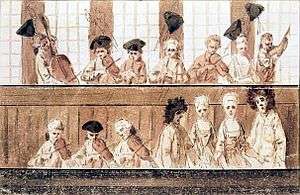Café-chantant
Café chantant (French: lit. "singing café"), café-concert or caf’conc, is a type of musical establishment associated with the Belle Époque in France. The music was generally lighthearted, sometimes risqué, even bawdy but, as opposed to the cabaret tradition, not particularly political or confrontational.

Although there is much overlap of definition with cabaret, music hall, vaudeville, etc. the café chantant was originally an outdoor café where small groups of performers performed popular music for the public.
National variations
The tradition of such premises as a venue for music has its origins in Paris and London of the 18th century, but gained its widest popularity in the late 19th and early 20th centuries with the growth of various other national "schools" of cafè chantant (besides French). Thus, one spoke of an Italian, German, or Austrian café chantant, for example. One of the most famous performers in this medium was violinist Georges Boulanger who performed in this style from 1910 till 1958.
In Spain it was known as a café cantante and became the centre for professional flamenco performances from the mid 19th century to the 1920s.
Cafés chantants were known as kafeşantan in Turkish, and many were opened in the Beyoğlu/Péra district of Istanbul in the early years of the twentieth century. They are described in great detail in the memoirs of such authors as Ahmed Rasim and Sermet Muhtar Alus. Earlier versions of the kafeşantan, known as kahvehane in Turkish, appeared in Istanbul during the Ottoman Era as early as 1554. Hundreds of them were opened continually, most of them with a social club status.[1]
In the Russian Empire, the term was taken wholesale into the Russian language as "kafe-shantan" (кафе-шантан); Odessa was the city best known for its numerous kafe-shantany.
Literary uses
The name Cafe Chantant appears in Araby, a short story by James Joyce (written c. 1904-1905; published 1914 in Dubliners).
The name Cafe Chantant appears in The Man Who Was Thursday: A Nightmare, by G. K. Chesterton (published 1908).
The name Café Chantant appears in Buddenbrooks, by Thomas Mann (published 1901).
The name Café Chantant appears in The Sundays of Jean Dézert, by Jean de La Ville de Mirmont (published 1914).